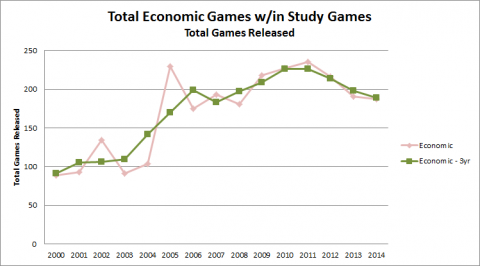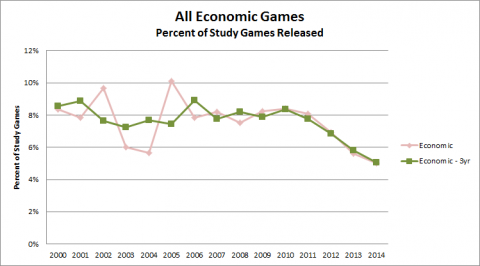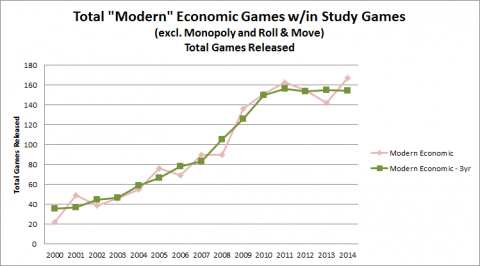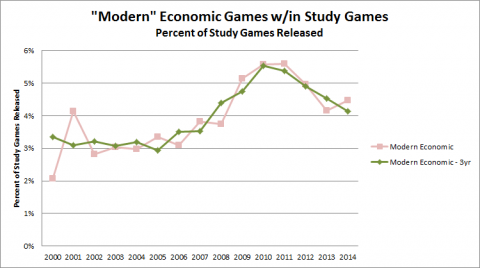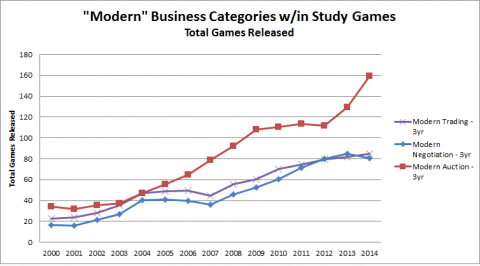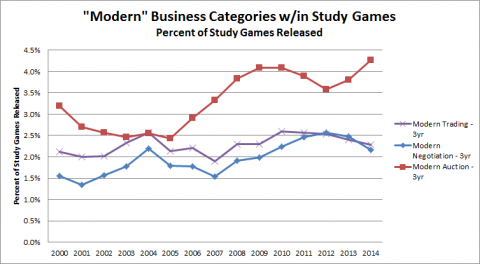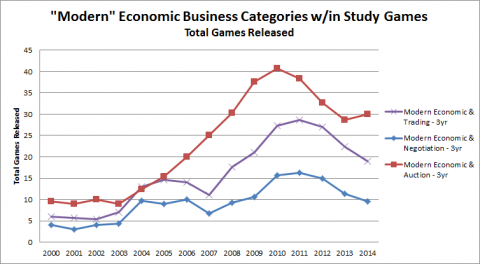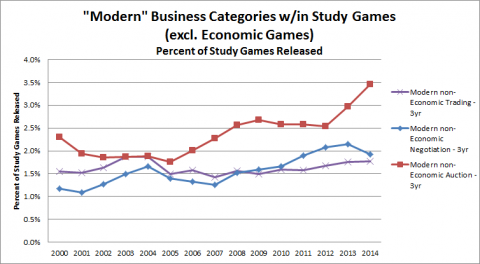Hobby Game Trends 2000-2014 Round 5: Economic & Business Games
Category Focus: Economic Games
Now that we understand a little about the categories available on BGG to direct our study, it is time to dive into our first one; Economic Games. Fortunately, BGG has an Economic game category, so our challenge is partly met already. However, we might also consider the question, “What makes an “Economic” game?” A recent Board Game Hour discussion revolved around “Business” games. Are all Economic games Business games and vice versa? Maybe not, but some other game categories and mechanics were mentioned in that discussion to identify a “Business” game that may be relevant, so I’ll take a look at those attributes as well.
At a Glance
Studying “Economic” game releases is complicated by the fact that there is one game that has monopolized the releases in this class for many decades; Monopoly. Monopoly is just one game, right? One game wouldn’t bias the data…
A common gamer complaint is that the standard response to their statement, “I play board games,” is “You mean like Monopoly?” The frequency of this response doesn’t come without cause. The Monopoly franchise is huge and the number of releases of Monopoly per year is also significant. When there is a new version of Monopoly, like the implementation of a licensed IP, there are many releases in different languages and production quality. A “single” release of Monopoly can bias the data for any given year. There is much to be said about Monopoly (and its clones), so we will save that for the next investigation round. Of note here is how I will report the data; with and without Monopoly.
Monopoly vs Modern: Additionally, I will include/exclude the “Roll/Spin and Move” mechanic, which represents many Monopoly clones (as well as Monopoly versions that don’t have “monopoly” in their title). It may be perceived as an unwarranted bias against a particular mechanic, but Monopoly and its clones, represented by the “Roll & Move” mechanic, skew the data for the games that are of primary interest to me. I will call all other games “Modern” Economic games, which may be a slanted term and the data set will surely include some traditional games, but I believe that the trend demonstrated by the data represents that of the modern, hobby game. Note: I will continue to use this term, Modern, and practice with other game categories to be reported later.
The Data
Economic Games
First, let’s look at total games released for all “Economic” games (including Monopoly and all mechanics). There is a steady increase until 2011 and then the releases start to fall off.
Since all game releases have risen steadily in the same period, we can expect the declining trend as a percent of games released to be even more pronounced. The peak in 2005 is consistent with all games releases, so that should smooth out some, but the low output in 2003 and 2004 is peculiar to this category.
As expected the releases of Economic games is fairly stable until 2007 when it starts a fairly steep drop. The raw data indicates that there may be a leveling out over the last 2 years, but we’ll have to wait a year or so to see if the decline continues or if it has hit a low point and is recovering.
Now let’s take a look at what I have called Modern Economic games. Due to the nature of the BGG search engine, this is a complicated data set to build. (I.E., it is possible to exclude multiple categories, but only one category can be included without narrowing to only games that are in all included categories). First, I have to get Economic games that are not Roll/Spin and Move. Then I have to get Economic games with “Monopoly” in the title that are also not Roll/Spin and Move (to catch the Monopoly games that are not identified as Roll/Spin and Move). This is a small number or releases, peaking at 25 in 2013. However, this is a small data set overall, so small numbers have big effects. I have to subtract the second set from the first set to get what I want. The resulting graphs of total games and percent of Study Games look like this:
Eliminating the effects of the periodic release cycle of Monopoly smooths out the curve some, but overall the data is still a little erratic. The decline is decreased which indicates something about Monopoly that we will analyze next round.
Note: Even with the exclusion of “Monopoly” and “Roll/Spin and Move,” there are still Monopoly versions in the result set; not many, but some. These tend to be non-English language versions or “Something-opoly” games (since I am filtering for “monopoly”) that have the “Dice Rolling” mechanic checked, but not “Roll/Spin and Move” even though the description of the game includes the phrase “roll and move.” Fortunately, it is a small number of games comparatively, so we will assume we have hit the target data pretty well.
Business Games
While we are looking at Economic games, it is a good time to also look at “Business” Games. To call a game a “Business” game may be a bit arbitrary, but based on the Board Game Hour discussion, I can assume that there are a few attributes of a game that cause people to think of them as related to business. Fortunately, a couple of these are also available as categories within the BGG data. From the discussion, I am prompted to look at games that include trading and negotiation. To those I have added auction & bidding. There is also a more specific BGG category of stock holding, but the number of games is very small. Let’s first look at these categories individually within the Study Games. Keep in mind that these are comparatively very small numbers of game releases, so any manipulation/math on the data can easily skew the results. I have jumped to the 3 year floating average to concentrate on the trends. Also complicating the data are a few games that have been released regularly in multiple versions.
These graphs show that “Modern” Trading and Negotiation games have pretty much followed the trend for all Study Games and Auction/Bidding games have grown at a faster rate. They may have a slight release cycle of about 4 years, but there isn’t strong evidence to confirm this.
When intersected with the Economic games attribute (games that have both Economic and Trading or Economic and Negotiation, etc.) the release trend takes on the characteristic of the dominant factor, Economic.
Conclusions
It appears that game producers lost interest in Economic games around 2007 and interest continues to drop. Other attributes that are typical of Business games, Trading and Negotiation, are following the major trend of games releases, but when combined with the Economic attribute, they follow the trend for all Economic games. Therefore, there is no distinction within Economic games of a more favored sub-type of Economic game.
Finally, if we look at these "Business" type mechanics used in games that are not Economic, we see that Trading is generally flat (i.e., matching pace with growth of all releases), Negotiation is showing moderate growth (with the exception of 2014), and Auction/Bidding has had strong growth over the last 10 years.
There are some interesting data related to Monopoly and Roll/Spin and Move games indicated in the data, so we will look at them next in what I will call “Traditional” games.
